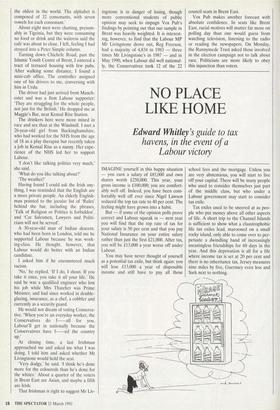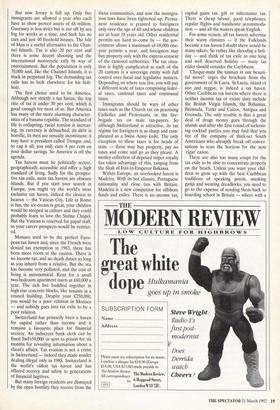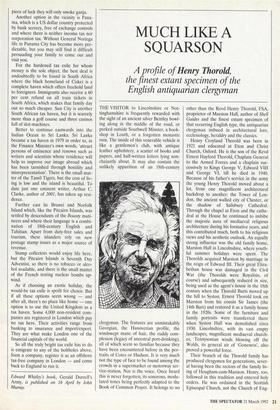NO PLACE LIKE HOME
Edward Whitley's guide to tax
havens, in the event of a Labour victory
IMAGINE yourself in this happy situation — you earn a salary of £85,000 and own shares worth £250,000. This year, your gross income is £100,000; you are comfort- ably well off. Indeed, you have been com- fortably well off ever since Nigel Lawson reduced the top tax rate to 40 per cent. The feeling might have grown into a habit.
But — if some of the opinion polls prove correct and Labour squeak in — next year you will find that the top rate of tax for your salary is 50 per cent and that you pay National Insurance on your entire salary rather than just the first £21,000. After tax, you will be £13,000 a year worse off under Labour.
You may have never thought of yourself as a potential tax exile, but think again: you will lose £13,000 a year of disposable income and still have to pay all those school fees and the mortgage. Unless you are very abstemious, you will start to live off your capital. There will be many people who used to consider themselves just part of the middle class, but who under a Labour government may start to consider tax exile.
Tax exiles used to be sneered at as peo- ple who put money above all other aspects of life. A short trip to the Channel Islands is sufficient to show what a claustrophobic life tax exiles lead, marooned on a small rocky island, only able to come over to per- petuate a dwindling band of increasingly meaningless friendships for 60 days in the year. And this deprivation is all for a life where income tax is set at 20 per cent and there is no inheritance tax. Jersey measures nine miles by five, Guernsey even less and Sark next to nothing. But now Jersey is full up. Only five immigrants are allowed a year who each have to show proven assets of £8 million. Guernsey is less strict but is cut off by sea fog for weeks at a time, and Sark has no cars and just 40 freehold houses. The Isle of Man is a useful alternative to the Chan- nel Islands. Tax is also 20 per cent and there is some decent shooting and the international motorcycle rally by way of entertainment. But the population is only 70,000 and, like the Channel Islands, it is stuck in perpetual fog. The demanding tax exile has to look elsewhere for his bolt- hole.
The first choice used to be America. Although not strictly a tax haven, the top rate of tax is under 30 per cent, which is good enough for most of us. But America has many of the more alarming character- istics of a banana republic. The standard of life is collapsing, racial tension is increas- ing, its currency is debauched, its debt is horrific, its men are sexually incontinent; it may have a president called Tsongas and, to cap it all, you only earn 4 per cent on your dollar savings. So America is off the agenda.
Tax havens must be politically secure, geographically accessible and offer a high standard of living. Sadly for the prospec- tive tax exile, most tax havens are obscure islands. But if you start your search in Europe, you might try the world's most exclusive tax haven, indeed the closest to heaven — the Vatican City. Life in Rome is fun, the ice-cream is great, your children would be steeped in culture and they could probably learn to love the Sistine Chapel. But the Vatican is reserved for papal staff, so your career prospects would be restrict- ed.
Monaco used to be the perfect Euro- pean tax haven and, since the French were denied tax exemption in 1963, there has been more room at the casinos. There is no income tax, and no death duties so long as you inherit from a relative. But the sea has become very polluted, and the cost of living is astronomical. Rent for a small two-bedroom apartment starts at £60,000 a year. The rich live huddled together in high-rise concrete blocks, like tenants in a council building. Despite your £250,000, you would be a poor relation in Monaco — and nobody goes into tax exile to be a poor relation.
Switzerland has primarily been a haven for capital rather than income and it remains a favourite place for financial secrecy. An indiscreet bank clerk can be fined SwFr50,000 or sent to prison for six months for revealing information about a client's affairs. Tax evasion is not a crime in Switzerland — indeed they made insider dealing illegal only in 1988. Switzerland is the world's oldest tax haven and has offered secrecy and safety to generations of financial fugitives.
But many foreign residents are dismayed by the open hostility they receive from the Swiss communities, and now the immigra- tion laws have been tightened up. Perma- nent residence is granted to foreigners only over the age of 60 and whose children are at least 18 years old. Other residential permits are hard to come by — the gov- ernment allows a maximum of 10,000 one- year permits a year, and foreigners may buy property only with the express consent of the cantonal authorities. The tax situa- tion is highly complicated as each of the 20 cantons is a sovereign entity with full control over fiscal and legislative matters. Depending on where you live, you will pay a different scale of taxes comprising feder- al taxes, cantonal taxes and communal taxes.
Immigrants should be wary of other taxes such as the Church tax on practising Catholics and Protestants, or the fire- brigade tax on male tax-payers. So although Switzerland is attractive, its tax regime for foreigners is as sharp and com- plicated as a Swiss Army knife. The only exception to these taxes is for heads of state — these may buy property, pay no taxes and come and go as they please. A motley collection of deposed tinpot royalty has taken advantage of this, ranging from the Shah of Iran to Emperor Bokassa.
Within Europe, an overlooked haven is Madeira. With its hot climate, Portuguese nationality and close ties with Britain, Madeira is a new competitor for offshore funds and exiles. There is no income tax, capital gains tax, gift or inheritance tax. There is cheap labour, good telephones, regular flights and handsome accommoda- tion — and all the waiters speak English.
For some reason, all tax havens advertise their warm climates — if the Falklands became a tax haven I doubt there would be many takers. So rather like choosing a holi- day — and think of tax exile as one long and well deserved holiday — many tax exiles should consider the Caribbean.
`Cheque-mate the taxman in one beauti- ful move!' urges the brochure from the government of St Lucia. St Lucia, island of sun and reggae, is indeed a tax haven. Other Caribbean tax havens where there is neither income tax or estate duty include the British Virgin Islands, the Bahamas, Bermuda, Turks and Caicos, Antigua and Grenada. The only trouble is that a great deal of drugs money goes through the islands and after the first round of welcom- ing cocktail parties you may find that you tire of the company of thick-set South Americans who abruptly break off conver- sations to scan the horizon for the next `cigar' canoe.
There are also too many coups for the tax exile to be able to concentrate properly on the beach. Unless you want your chil- dren to grow up with the best Caribbean traditions of speaking patois, smoking ganja and wearing dreadlocks, you need to go to the expense of sending them back to boarding school in Britain — where with a piece of luck they will only smoke ganja.
Anothei option in the vicinity is Pana- ma, which is a US dollar country protected by bank secrecy, free of exchange controls and where there is neither income tax nor corporation tax. Without General Noriega life in Panama City has become more pre- dictable, but you may still find it difficult persuading your family to come out and visit you.
For the hardened tax exile for whom money is the sole object, the best deal is undoubtedly to be found in South Africa where the black homeland of Ciskei is a complete haven which offers freehold land to foreigners. Immigrants also receive a 60 per cent refund on all train tickets in South Africa, which makes that family day out so much cheaper. Sun City is another South African tax haven, but it is scarcely more than a golf course and three casinos full of slot-machines.
Better to continue eastwards into the Indian Ocean to Sri Lanka. Sri Lanka became a tax haven in 1979 in order to, in the Finance Minister's own words, 'attract persons of eminence and renown such as writers and scientists whose residence will help to improve our image abroad which has been tarnished through hostility and misrepresentation'. There is the small mat- ter of the Tamil Tigers, but the cost of liv- ing is low and the island is beautiful. To date just one eminent writer, Arthur C. Clarke, author of 2001, has taken up resi- dence.
Further east lie Brunei and Norfolk Island which, like the Pitcairn Islands, was settled by descendants of the Bounty muti- neers and where their language is a combi- nation of 18th-century English and Tahitian. Apart from duty-free sales and tourism, these islanders rely on new postage stamp issues as a major source of revenue.
Stamp collectors would enjoy life here, but the Pitcairn Islands is Seventh Day Adventist, so there is no tobacco or alco- hol available, and there is the small matter of the French testing nuclear bombs up- wind.
As if choosing an exotic holiday, the would-be tax exile is spoilt for choice. But if all these options seem wrong — and after all, there's no place like home — one option is to use the United Kingdom as a tax haven. Some 4,000 non-resident com- panies are registered in London which pay no tax here. Their activities range from banking to insurance and import/export. They are what make London one of the financial capitals of the world.
So all the truly bright tax exile has to do is emigrate to any of the boltholes above, form a company, register it as an offshore tax-free company in London — and come back to England to run it.
Edward Whitley's book, Gerald Durrell's Army, is published on 16 April by John Murray.




























































 Previous page
Previous page